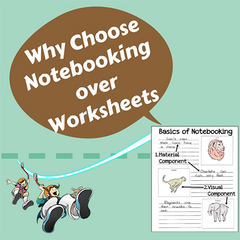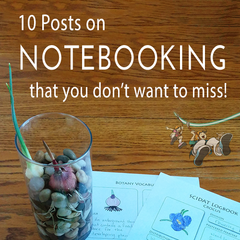FREE Shipping on all our products! (Please expect 1 to 1.5 weeks for delivery due to transit delays. We ship every day including Saturday
FREE Shipping on all our products! (Please expect 1 to 1.5 weeks for delivery due to transit delays. We ship every day including Saturday
30 Tips you can listen right now to help you with science in your homeschool {Season 6 Recap}
May 11, 2020 5 min read

For season 6 of The Tips for Homeschool Science Show, we shared three tips to help you with an aspect of science in your homeschool in each of the ten episodes. We wanted to put them all 30 tips together in one place to make it easier for you!
Let's dig in...
30 Tips to help you with science in your homeschool

3 Tips for inviting the magic of exploration into your homeschool
Key Takeaway -> Give your children the opportunity to stretch their imagination and to try out their ideas through exploration.
Exploration - the foundation of science. But how do we invite the magic of exploration into our homeschools? In this episode, I'll share three tips to help you roll out the discovery-welcome-mat!
Here is how we encourage exploration in our homeschool:
- Provide them with the materials.
- Fill their minds with ideas.
- Model exploration for them.
3 Tips to help you take advantage of the benefits of science notebooking
Key Takeaway->The beauty of notebooking is that it is a tool that can grow with your students. Once you understand the basics, you can scale-back or level-up to meet the needs of your students.
Notebooking is becoming a common recommendation in homeschooling circles because it is such an effective tool. It’s quite the departure from traditional worksheets, so how do you take advantage of the benefits of notebooking for science?
This is how we take advantage of notebooking in science:
- Learn about notebooking.
- Don't be afraid to get it wrong.
- Let notebooking grow with your students.
3 Tips for getting rid of the mess and organizing those science notebooks
Key Takeaway->To keep the notebooking-clutter beast at bay – plan digitally, keep those loose pages together, and store your past notebooks in an easy-to-reference place.
Paper, papers everywhere!! Notebooking is a fantastic tool we can use to teach science, but unless your notebooking pages come pre-made and bound together in a book, you will struggle with a mess of pages to deal with. So, how do you organize all those papers into notebooks?
Here's how I organize our notebooks:
- Plan digitally.
- Keep it all together.
- Store it all in an accessible place.
3 Tips to help you homeschool with a big age gap
Key Takeaway->Having a big age gap between your kiddos may not allow for easy combining of subjects, but that doesn’t mean you can't homeschool successfully.
Do you have a big age gap between your oldest and your youngest? We have 8 years between our two kiddos and have homeschooled both of them. At times, it was the best thing ever to have a big age gap. At times, it was the most challenging thing ever to have a big age gap. And it’s out of those experiences that I am sharing today’s three tips to help you homeschool with a big age gap!
Here is what we do:
- Connect with morning time.
- Foster independent learning.
- Don't divide, provide.
3 Tips to gently encourage independent learning in your homeschool
Key Takeaway->It takes some effort on our part to encourage independent learning, but the rewards are well worth it!
One of the key skills that we as homeschoolers can impart to our students is to teach them how to learn independently. This is a gradual process, but today I want to share with you three tips to help you encourage your students to get on the road to independent learning.
These are the three things we have done to set our kiddos on the road to independent learning:
- Know when they are ready.
- Choose a curriculum that fosters independence.
- Set them up for success.
3 Tips for doing experiments at home without the suggested supplies
Key Takeaway->If you don't have the supplies - try to find a similar material or swap the experiment out for a different one before you scratch it and head outside to observe science in your own backyard.
One of the biggest struggles with doing experiments at home is having the right supplies on hand. But you don’t need to ditch hands-on science activities just because you don’t have the exact supplies suggested for the experiment! In this episode, we are going to chat about how you can rescue that science-learning opportunity.
When you don't have the supplies for an experiment, try one of these tips:
- Find something similar.
- Swap it out for a different experiment.
- Just head outside.
3 Tips for homeschooling during a stressful season without losing your mind
Key Takeaway->If you want to continue homeschooling during this stressful season, I recommend you read a lot, laugh a lot, and make a lot of good memories.
I think that recent events definitely qualify as “stressful.” We’ve had a lot of changes to handle, in fact, some of you may be tuning in for the very first time as you find yourself a brand-new, sudden homeschooler. So, this week, we are going to chat about three tips to help you homeschool during this and other stressful seasons without losing your mind.
These three things help me stay sane during difficult times:
- Read a lot.
- Laugh a lot.
- Make a lot of good memories.
3 Tips to help you enjoy reading aloud in your homeschool a whole lot more
Key Takeaway->The point is to make your read-aloud time work for you, not to have some Norman Rockwell homeschooling moment.
In our last episode, I said that we were reading aloud a lot more these days. But if you have one (or more) of those wiggly children, bursting with energy, reading aloud may end up as stressful instead of soothing. So this week, we are going to chat about three tips to help you enjoy reading aloud in your homeschool.
Years of homeschooling experience packed with trial and error have taught me to do these things when reading aloud:
- Read aloud after breaks.
- Keep hands busy.
- Pause and discuss.
3 Tips for adding coding, engineering, and robotics to your spare time
Key Takeway->Use a bit of the spare time you find yourself with to add in a bit of STEM education, especially things about coding, engineering, and robotics.
We are all finding ourselves with a bit more time on our hands. And over the next two episodes, I am going to share a few ideas to fill that time with a bit of science. In this episode, I am sharing three tips for adding in robotics, coding, and engineering.
You can do this in three ways:
- Play computer games.
- Read a few STEM books.
- Let them dream up crazy projects.
3 Tips for doing a science fair project at home during your spare time
Key Takeway->The science fair project takes a bit of time to complete, so doing one during a break is a great way to fit one in.
Science fair projects take a good chunk of time to complete. And since we find ourselves with a bit more at-home time than we are used to, now is the perfect opportunity to do a science fair project.
Here are three tips to help you out:
- Follow the 8 steps.
- Tie it into what you are studying.
- Do a video presentation.
Wrapping it up
Well, that's a look at season 6 of the Tips for Homeschool Science Show. Here's a sneak peek at what season 7 will be about...
If there's a question you want to be answered or a topic you want to be covered in future episodes, let us know in the comments below!
Also in Elemental Science Blog
What is the difference between a report and a research paper for science?
May 13, 2024 2 min read

In the middle school and high school years, students frequently receive assignments for research papers or reports in science and history. But what is the difference? And how to you go about writing both of these? Click "Read More" to get answers.
Why Choose Notebooking over Worksheets? Here are 3 Reasons...
May 06, 2024 2 min read

Why choose notebooking over worksheets? Click "Read More" to see three reasons why we have chosen notebooking over worksheets.
10 Posts On Notebooking That You Don’t Want To Miss
April 22, 2024 3 min read

We love notebooking at Sassafras Science! And these ten posts on notebooking will help you understand the how's and why's of this super effective tool.
Subscribe
Sign up to get the latest on sales, new releases and more …

